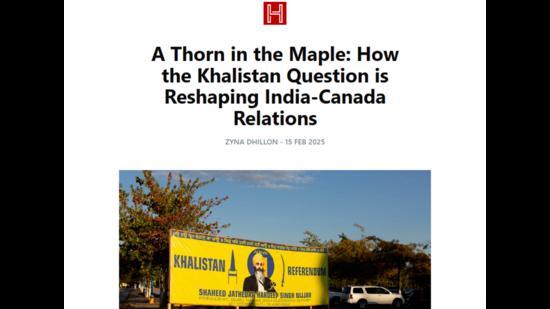
Harvard Journal Deletes Article on Khalistani Terrorism, Criticised
Harvard University has come under fire for deleting an article that shed light on the growing threat of Khalistani terrorism and its impact on Indo-Canadian relations. The article, titled “A Thorn in the Maple: How the Khalistan Question is Reshaping India-Canada Relations”, was published in a student-run journal at Harvard University. However, it was reportedly withdrawn due to pressure from pro-Khalistani quarters.
The article aimed to highlight the increasing presence of Khalistani extremism in Canada, particularly among the Sikh diaspora, and its implications for Indo-Canadian relations. The authors of the article claimed that Khalistan, a proposed sovereign state for Sikhs, was being used as a platform to spread hatred and violence against India.
The deletion of the article has sparked widespread criticism, with many accusing Harvard University of succumbing to pressure from pro-Khalistani groups. The US-based Hindu body, Hindu Human Rights, has termed the withdrawal of the article as a “shameful” act.
Khalistani terrorism is a growing concern in Canada, with many incidents of violence and extremism being reported in recent years. The Canadian government has designated several Khalistani groups as terrorist organizations, and there are ongoing efforts to combat the spread of extremist ideologies in the country.
The article in question was published in the Harvard International Review, a student-run journal that focuses on international relations and global affairs. The authors of the article claimed that Khalistan was being used as a tool to spread hatred and violence against India, and that the rising presence of Khalistani extremism in Canada was having a significant impact on Indo-Canadian relations.
However, the article was reportedly withdrawn due to pressure from pro-Khalistani groups, who claimed that it was biased and inaccurate. The journal’s editor-in-chief, Rachel Rodriguez, apologized for any harm caused by the article and claimed that it was removed due to concerns about its accuracy.
Despite the withdrawal of the article, many have criticized Harvard University for bowing to pressure from pro-Khalistani groups. The Hindu Human Rights organization has called the withdrawal of the article a “shameful” act and has accused Harvard University of compromising its academic integrity.
“The deletion of the article is a clear example of how academic institutions are being intimidated by extremist groups,” said the organization’s president, Dr. Suresh Sanghvi. “Harvard University has a reputation for academic excellence, but its decision to withdraw the article is a betrayal of that reputation.”
The controversy surrounding the article has sparked a wider debate about academic freedom and the role of universities in addressing issues of extremism and terrorism. Many have argued that universities have a responsibility to provide a platform for critical and nuanced discussions about complex issues, even if they are controversial or unpopular.
In conclusion, the deletion of the article on Khalistani terrorism by Harvard University’s student-run journal has sparked widespread criticism and raises important questions about academic freedom and the role of universities in addressing issues of extremism and terrorism. While the journal’s editor-in-chief has apologized for any harm caused by the article, many have called for a more nuanced and critical approach to understanding the complex issues surrounding Khalistani terrorism and its impact on Indo-Canadian relations.
Source:






